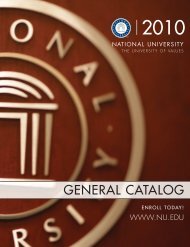Journal of Research in Innovative Teaching - National University
Journal of Research in Innovative Teaching - National University
Journal of Research in Innovative Teaching - National University
You also want an ePaper? Increase the reach of your titles
YUMPU automatically turns print PDFs into web optimized ePapers that Google loves.
Language as Tool for a Global Education:<br />
Bridg<strong>in</strong>g the Gap Between the Traditional and a Global Curriculum<br />
Gladys N. Focho<br />
Abstract<br />
Students <strong>in</strong> develop<strong>in</strong>g countries such as Cameroon are be<strong>in</strong>g taught the hard facts <strong>of</strong> academics, oblivious <strong>of</strong> the<br />
importance <strong>of</strong> a global education for global citizenship. Features <strong>of</strong> a global curriculum such as cross-cultural<br />
awareness, global issues, universal values, critical th<strong>in</strong>k<strong>in</strong>g, and experiential learn<strong>in</strong>g are m<strong>in</strong>imized <strong>in</strong> the <strong>of</strong>ficial<br />
curriculum. This paper sets out to identify what constitutes a global education curriculum and how it could be<br />
<strong>in</strong>tegrated <strong>in</strong> English language teach<strong>in</strong>g without jeopardiz<strong>in</strong>g the <strong>of</strong>ficial curriculum. This is possible because<br />
English is not subject specific, permitt<strong>in</strong>g the use <strong>of</strong> material from any subject area to teach language skills.<br />
Key Words<br />
Gglobal education, global curriculum, global citizenship, global issues, <strong>in</strong>tegrated learn<strong>in</strong>g, <strong>of</strong>ficial curriculum,<br />
content proper, content carrier<br />
Introduction<br />
The debate on global education is an ongo<strong>in</strong>g one, and the benefits <strong>of</strong> such an education can<br />
hardly be overemphasized. With the world becom<strong>in</strong>g a global village and with high job mobility<br />
across countries and cont<strong>in</strong>ents, students who are the future generation should be global citizens<br />
capable <strong>of</strong> liv<strong>in</strong>g and work<strong>in</strong>g effectively anywhere <strong>in</strong> the world that is characterized by ethnic<br />
diversity, cultural pluralism, and <strong>in</strong>terdependence. Conversely, people must be able to accept and<br />
tolerate people <strong>of</strong> other cultures <strong>in</strong> their midst. Furthermore, a global citizen should be conscious<br />
<strong>of</strong> global issues important to the planet and not only one country or region and should be able to<br />
see the <strong>in</strong>terrelatedness between global and local issues and relate global issues to local contexts.<br />
Such exam<strong>in</strong>ation <strong>of</strong> issues and events from different perspectives (perspective consciousness, or<br />
multiple images <strong>of</strong> the world) helps people understand how the world really works and how their<br />
actions affect others far away and vice versa.<br />
It is also vital for students to be able to exam<strong>in</strong>e their own values and attitudes and<br />
develop knowledge and skills to fight prejudice and discrim<strong>in</strong>ation and to participate actively <strong>in</strong><br />
a global community both at the local and <strong>in</strong>ternational levels (Osler & Starkey, 2005; Roux,<br />
2001). Therefore, it becomes imperative for students to be educated to become global citizens<br />
with regard to cross-cultural sensitivity, awareness <strong>of</strong> global issues, cultivation <strong>of</strong> universal<br />
values, development <strong>of</strong> critical th<strong>in</strong>k<strong>in</strong>g skills, and experiential learn<strong>in</strong>g. This is the essence <strong>of</strong><br />
global education. It is the education <strong>of</strong> the whole child with special emphasis on the affective<br />
doma<strong>in</strong> <strong>of</strong>ten m<strong>in</strong>imized <strong>in</strong> the regular curriculum. Students need to develop empathic<br />
understand<strong>in</strong>g for people <strong>of</strong> other cultures and concern for what is happen<strong>in</strong>g around the world.<br />
In the <strong>in</strong>troduction to her book, Suarez-Orozco (2007) underl<strong>in</strong>es the gap between what is taught<br />
<strong>in</strong> schools and the realities <strong>of</strong> the world. A global approach to education is an attempt to bridge<br />
this gap.<br />
What, then, are the implications <strong>of</strong> a global education Why do teachers not <strong>in</strong>clude it <strong>in</strong><br />
their teach<strong>in</strong>g programs, and how can it be <strong>in</strong>tegrated <strong>in</strong> the school curriculum<br />
135

















